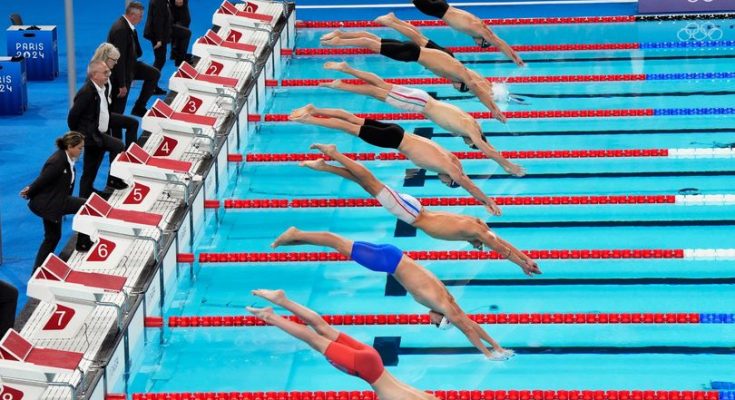A quirk in the swimming pool at the Paris Olympics may be keeping the record books largely unscathed during these summer games.
The theory floating around the deck is that the temporary pool built at La Défense Arena in Nanterre, France, a suburb of Paris, is too shallow, creating waves that slow swimmers down.
The pool is reportedly 2.15 meters deep, which is above the Olympic standards of 2 meters but below the World Aquatics minimum of 2.5 meters.

Swimmers compete in the men’s 200-meter butterfly final at the 2024 Summer Olympics, Wednesday, July 31, 2024, in Nanterre, France.AP
But they could be much deeper – in the 2008 Beijing Olympics, the swimming pool was 10 feet deep, which is just over 3 meters, per the Athletic.
“It’s absurdly slow,” an anonymous swimming official told Sports Illustrated. “It lacks depth, but it also has strange levels. And when you have a shallow pool with as many underwater cameras as we now have, it doesn’t help settle the water.”
Amandine Aftalion, a French scientist, explained to The Athletic that a shallow pool can cause turbulence, creating resistance against the swimmers.
“… It slows down the swimmers. … It’s crazy that they built this pool. It’s obvious, because many swimmers are really good. They’re in top shape. They could have broken their records.”
The “slow” pool has kept swimmers from breaking the world records that are custom in a sport that is getting faster and faster by the year.
No world records had been set through Tuesday’s games, five days into the Olympics.

Finally, on Wednesday, China’s Pan Zhanle broke his own world record in the men’s 100-meter freestyle by .4 seconds.
But if that’s all, it’s far short of what swimmers usually pull off during the summer games.
In Beijing, for example, 25 world records were set by individuals and teams combined.
During the Olympics in 2021 in Tokyo, six world records were broken.
In 2016, eight more were broken in Rio.
“The pool is fast compared to your neighborhood swim club. However, it is not ideal for record setting,” Ken Ono, an analyst that works with American swimmers, told Yahoo Sports. “The shallow depth is a primary reason. I have heard from a few competitors that they have been forced to (slightly) modify their dives off the blocks.”



